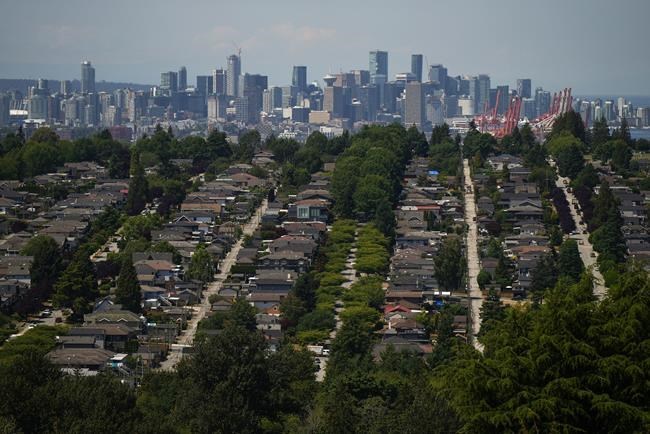LANGLEY, B.C. — British Columbia Premier David Eby is warning real estate investors and speculators that his government is tilting the rules towards families seeking homes as it tightens the rules on short-term rentals.
Eby said Thursday that the rule changes on May 1 will limit short-term rental units to within the principal home of a host, but the move isn't a ban on platforms such as Airbnb if they aren't used to create de facto hotels from B.C.'s housing stock.
"If there's a major event (such as a) Taylor Swift concert, a FIFA-like event and somebody wants to rent out their primary residence and go away for the weekend to avoid the crush of the crowds, they can still do that," Eby said.
The changes were announced by the government last spring, giving those who own short-term rentals a year to conform.
Eby said the changes will allow both the province and local governments to crack down on speculators.
"If you're flipping homes, if you're buying places to do short-term rental, if you're buying a home to leave it vacant, we have consistently, publicly, repeatedly sent the message: Do not compete with families and individuals that are looking for a place to live with your investment dollars."
Eby made his comments as the province announced new figures gathered in March that showed more than 19,000 entire homes being listed as short-term rentals.
Housing Minister Ravi Kahlon said the new rules also require short-term rental platforms such as Airbnb to share listed property data with the province and local governments.
He said they expect a significant amount of the homes listed on short-term sites to be back in the long-term rental pool.
"Our view is even if half of those units were to come back onto the market, that is substantial," Kahlon said. "The cost that it takes to build new housing, when you can get even half of the 19,000 back on the market, that'll make a substantial difference in our communities."
He said previous efforts to limit short-term rentals are increasing housing supply in some places.
"We're seeing, already, in many communities that action happening," Kahlon said. "We have heard many stories of people finding rentals now because of opportunities when it comes to short-term rentals coming onto the market."
The new principal residence requirement for short-term rentals will allow local governments to request that a platform remove listings that don’t display a valid business licence.
Valid short-term rental hosts will also be required to display a business licence number on their listings if a licence is required by local government.
The new rules will apply to more than 60 B.C. communities, and Kahlon said a compliance enforcement unit will be phased in to help municipalities deal with rule violations.
Much of the monitoring and enforcement, however, will be conducted online through a new rental data portal that will allow local governments to track and request removal of listings from platforms.
"We have found that there are so many digital tools available for us to be able to ensure that both the cities have the accountability from the platforms and the platforms have the information that they need to be able to take action," Kahlon said.
The rules do include some exceptions, including some strata hotels and motels operating before last December being exempt if certain criteria are met.
Eby said the overall message to property investors looking for short-term gains is clear: Build homes that people need and government will do all it can to help expedite the process.
"But if you are standing neck and neck with a family that's looking for a place to live, and you're trying to do a speculative investment, (while) they're looking for a place to live, we are going to tilt the deck every single time towards that family," Eby said. "And we're gonna keep doing it."
Eby also said a positive side-effect of short-term rental regulation has been the re-emergence of hotel construction, with 1,400 rooms "in the development pipeline" in Vancouver.
"Those investors in those hotel rooms weren't able to make the decision to proceed," Eby said, citing the previous competition from short-term rentals. "Very clearly, with these regulations in place, there will be visitors to stay in hotel rooms, there will be a market for hotel rooms and they're making the decision to proceed. This is very good news."
This report by The Canadian Press was first published April 18, 2024.
The Canadian Press



